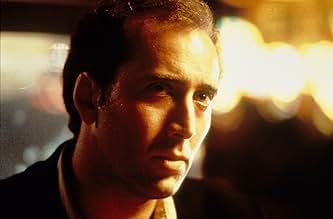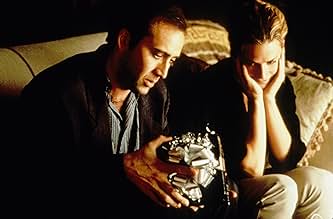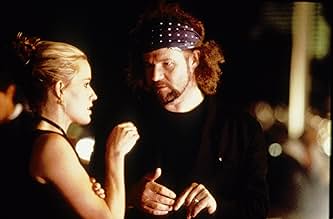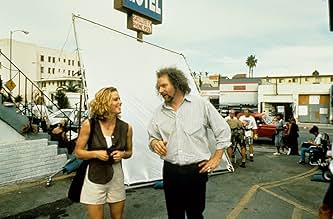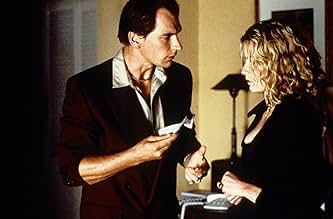हॉलीवुड के पटकथा लेखक बेन सैंडरसन, जिन्होंने अपनी शराब के कारण सब कुछ खो दिया, खुद को मौत के घाट उतारने के लिए लास वेगास पहुंचता है।हॉलीवुड के पटकथा लेखक बेन सैंडरसन, जिन्होंने अपनी शराब के कारण सब कुछ खो दिया, खुद को मौत के घाट उतारने के लिए लास वेगास पहुंचता है।हॉलीवुड के पटकथा लेखक बेन सैंडरसन, जिन्होंने अपनी शराब के कारण सब कुछ खो दिया, खुद को मौत के घाट उतारने के लिए लास वेगास पहुंचता है।
- 1 ऑस्कर जीते
- 32 जीत और कुल 30 नामांकन
Albert Henderson
- Man at Strip Bar
- (as Al Henderson)
फ़ीचर्ड समीक्षाएं
"Leaving Las Vegas" is an insightful, harrowing experience about the binding forces of true romance, the power of encouragement and compassion, and the tragic effects of alcoholism. The performances are absolutely astounding: Nicholas Cage delivers one of the most unforgettable, genuine, and human performances ever captured on film (a well-deserved Oscar for every reason), and Elisabeth Shue, as his soul provider and protector through the trauma of his alcoholic turmoil is sentimental, passionate, and definitely deserving of the Oscar for Best Actress in 1995, providing us with the eye of Ben Sanderson's heart and soul, as his equally troubled lover who has pledged to stay with him through tears and trials. Director Mike Figgis is intensely effective in following the many turmoils of Sanderson as he copes with terminal alcoholism, even going so far as to declaring he will "drink himself to death in Las Vegas", and the effects of his struggle upon his functions, health, and spirit, as well as the corresponding attributes of his loyal lover, Sara. I'm certain that anyone who has experienced the turmoil of alcoholism or has been deeply involved with such an abuser will gravely appreciate the realism and depth of this film to address the egregious effects of drinking constantly, and how this alcoholism tears many lives literally apart. I was horrified by Sanderson's dependence upon alcoholism as a substitute for happiness and control, and Nicholas Cage's uncanny human performance, with all of his appropriate, convincing twitches and erratic movements, enhanced the compassion and torment I felt for this character, who has literally surrendered his life to this terrible disease of alcoholism. We gasp in horror as we see Sanderson taking a shower with a bottle of gin in hand, and trembling to the refrigerator for a bottle of vodka: these are the true, tragic symptoms of alcoholism, and this film does an excellent job in addressing them. A brilliant, tragic, yet extremely essential study of the disease of alcoholism and how it can destroy every aspiration, every desire, and every state of consciousness we have within ourselves, when we are constantly craving "one more bottle of vodka" 24 hours a day, 7 days a week... Nicholas Cage delivers one of the most heartfelt and eerily convincing performances in the history of film, and this is one lamentable, subliminal look at one of the saddest and unnecessary addictions in humans: striving to either enhance, better, or in this case, destroy their lives in constantly drinking intoxicating and deadly substances. Sanderson to Sara: "You can never make me stop drinking"--- the sad, yet frighteningly real state of mind of a disparaged, hopeless, alcoholic. **** out of ****
Nic Cage is hit and miss with me. This is him at his best. His pain, apathy, hopelessness, helplessness, pathetic-ness (if that's a word) is heart wrenching. You can't help but pity him but at the same time you know he's on the correct path -- for him. It's sad. But beautiful at the same time because of his relationship with her. The thing that makes this performance so amazing to me is that he's usually such a loud, boisterous character, sometimes to the point of obnoxiousness but here he is so understated. If it's not the best performance of all time, it is definitely his best performance. For me.
Leaving Las Vegas is a very powerful character drama that happens to be the best acting Nicholas Cage has ever done. We are so used to his over-the-top performances, but this role is very reserved. He does play an alcohol addict, but he isn't crazy for the majority of the film and that's a relief. This film was made on a very cheap budget, but that doesn't matter when we get too involved in the story and the relationship between the two main characters.
Mike Figgis's film is about a Hollywood screenwriter named Ben who loses everything thanks to his alcoholism. He decides to go to Las Vegas to literally drink himself to death and that's where he meets a prostitute, Sera. They form a relationship despite their issues and each realize they form a special bond with each other.
The acting is very good. Nic Cage does a career role and his portrayal of an alcoholic is very realistic and disturbing. I'm perturbed on how much alcohol he drank in the film. Elizabeth Shue does very well as Sera and we are able to feel her pain despite her profession.
Overall, this is a very surreal and realistic drama that focuses mightily on characterization. I don't like what each person does, but somehow the movie makes me feel bad for them and root for good things to happen to our main characters. Also, I really liked the look and the feel of the film. It gives out a more realistic feeling. Thanks to the raw, gritty, and powerful performances, this movie works on a high level. I rate this film 9/10.
Mike Figgis's film is about a Hollywood screenwriter named Ben who loses everything thanks to his alcoholism. He decides to go to Las Vegas to literally drink himself to death and that's where he meets a prostitute, Sera. They form a relationship despite their issues and each realize they form a special bond with each other.
The acting is very good. Nic Cage does a career role and his portrayal of an alcoholic is very realistic and disturbing. I'm perturbed on how much alcohol he drank in the film. Elizabeth Shue does very well as Sera and we are able to feel her pain despite her profession.
Overall, this is a very surreal and realistic drama that focuses mightily on characterization. I don't like what each person does, but somehow the movie makes me feel bad for them and root for good things to happen to our main characters. Also, I really liked the look and the feel of the film. It gives out a more realistic feeling. Thanks to the raw, gritty, and powerful performances, this movie works on a high level. I rate this film 9/10.
Not unlike John Huston's Under The Volcano, Leaving Las Vegas borrows from Greek mythology, obliquely mirroring the tragedy and pathos of Orpheus' failed attempt to rescue his dead wife, Eurydice, from Hades. Mike Figgis obliges us with a helpful hint in the scene where Nicolas Cage gives Elizabeth Shue a present of earrings: Greek cameos.
As in the ancient tale, love challenges the inevitability of death, although, in the case of LLV, roles are upended and sometimes blurred, and Orphean references are either thinly disguised, or non-specific to the point of being thoroughly sublimated. Academic, to be sure, but completely acceptable as long as LLV can sustain itself and remain engaging. And it surely does, thanks to Figgis' intelligent script and direction, Cage's role as a down-and-out writer and his protracted self-destruction, and Shue's portrayal of a lonely hooker, lifting that old bromide beyond what could have been routine, to a level not seen since Jane Fonda's character in Klute. Excellent performances all around.
With all that said, this film is not for everyone (in particular those who only respond to gratuitous sex, car chases, and mindless pyrotechnics). The lurid depictions of despair, self-loathing, and violence could put off even the most hardened social worker. In my mind's eye, I could see psychiatrists amongst the theater audiences, furiously jotting down their observations. Understandable; the two principal characters are, in the common parlance, screwed up. One cannot cope with failure, so decides to opt out, while the other does cope, but only barely, existing along the ragged edges of what passes for society in Nevada Hell. These details, though, tend to outline and, indeed, strengthen the true heart of this film: Sacrifice and Unconditional Love.
If this film is not for everyone, then who is it for? Those with real life experience and the maturity gained thereby. Those with strong emotional constitutions. Anyone appreciative of impassioned performances. Freudians. Alcoholics, recovering and otherwise. Pimps. Priests. Classicists. Petty whiners in need of perspective. And, more than anyone else, couples who plan on breaking up. In sickness and in health, 'til death do us part. 9.5 out of 10.
As in the ancient tale, love challenges the inevitability of death, although, in the case of LLV, roles are upended and sometimes blurred, and Orphean references are either thinly disguised, or non-specific to the point of being thoroughly sublimated. Academic, to be sure, but completely acceptable as long as LLV can sustain itself and remain engaging. And it surely does, thanks to Figgis' intelligent script and direction, Cage's role as a down-and-out writer and his protracted self-destruction, and Shue's portrayal of a lonely hooker, lifting that old bromide beyond what could have been routine, to a level not seen since Jane Fonda's character in Klute. Excellent performances all around.
With all that said, this film is not for everyone (in particular those who only respond to gratuitous sex, car chases, and mindless pyrotechnics). The lurid depictions of despair, self-loathing, and violence could put off even the most hardened social worker. In my mind's eye, I could see psychiatrists amongst the theater audiences, furiously jotting down their observations. Understandable; the two principal characters are, in the common parlance, screwed up. One cannot cope with failure, so decides to opt out, while the other does cope, but only barely, existing along the ragged edges of what passes for society in Nevada Hell. These details, though, tend to outline and, indeed, strengthen the true heart of this film: Sacrifice and Unconditional Love.
If this film is not for everyone, then who is it for? Those with real life experience and the maturity gained thereby. Those with strong emotional constitutions. Anyone appreciative of impassioned performances. Freudians. Alcoholics, recovering and otherwise. Pimps. Priests. Classicists. Petty whiners in need of perspective. And, more than anyone else, couples who plan on breaking up. In sickness and in health, 'til death do us part. 9.5 out of 10.
Ben Sanderson is an alcoholic, who after getting released from his well paid screen writing position, heads to Vegas with his severance pay. Where he seriously plans to drink himself to death. But whilst cruising down the strip he meets Sera, a nicely turned out prostitute, and both troubled souls come together in an unlikely romance.
Based around the semi-autobiographical novel by John O'Brien, an alcoholic who committed suicide before the film made it to the screen, this is a sad, dark and deeply upsetting picture. Sanderson and his plight has no motive, we are not fed reasons for his nihilistic behaviour. We find him at the beginning of the film joyously hurtling thru a liquor market isle, promptly filling his shopping cart with bottles of liquor. From here on in we know that this is no ordinary film about an alcoholic trying to get off the booze, we are on a train to Bleakville, stops at Love and Liberation seem a very long way away.
Enter Sera, the sweet and wholesome prostitute, who having escaped the abusive and borderline psycho pimp, Yuri, is herself in need of liberation. But can she carry the burden of both as this unlikely and almost certainly doomed romance starts to become significant? Nicholas Cage as Sanderson is terrific, very compelling, realistic and segueing from zany wired comedy to the desolation of Sanderson's death wish descent within a heart beat. Elisabeth Shue as Sera is also incredibly potent, if perhaps guilty of looking too pristine, and prompting questions of why she would be drawn to Ben's world anyway?
Shue none the less works her socks off to make Sera sensitive and believable. Directed by Mike Figgis, who shot it beautifully in Super 16 film, the film won a Best Actor Academy Award for Cage, and garnered nominations for Best Actress {Shue} & Best Director and Best Adapted Screenplay {both Figgis}. Massively popular and praised on release, it has lost none of the impact that it had back then. 8/10
Based around the semi-autobiographical novel by John O'Brien, an alcoholic who committed suicide before the film made it to the screen, this is a sad, dark and deeply upsetting picture. Sanderson and his plight has no motive, we are not fed reasons for his nihilistic behaviour. We find him at the beginning of the film joyously hurtling thru a liquor market isle, promptly filling his shopping cart with bottles of liquor. From here on in we know that this is no ordinary film about an alcoholic trying to get off the booze, we are on a train to Bleakville, stops at Love and Liberation seem a very long way away.
Enter Sera, the sweet and wholesome prostitute, who having escaped the abusive and borderline psycho pimp, Yuri, is herself in need of liberation. But can she carry the burden of both as this unlikely and almost certainly doomed romance starts to become significant? Nicholas Cage as Sanderson is terrific, very compelling, realistic and segueing from zany wired comedy to the desolation of Sanderson's death wish descent within a heart beat. Elisabeth Shue as Sera is also incredibly potent, if perhaps guilty of looking too pristine, and prompting questions of why she would be drawn to Ben's world anyway?
Shue none the less works her socks off to make Sera sensitive and believable. Directed by Mike Figgis, who shot it beautifully in Super 16 film, the film won a Best Actor Academy Award for Cage, and garnered nominations for Best Actress {Shue} & Best Director and Best Adapted Screenplay {both Figgis}. Massively popular and praised on release, it has lost none of the impact that it had back then. 8/10
क्या आपको पता है
- ट्रिवियाAuthor John O'Brien, on whose novel this movie is based, committed suicide two weeks after the movie went into production. Director Mike Figgis contemplated abandoning the project, but decided the film would make a good memorial for O'Brien.
- गूफ़Yuri is supposed to be swearing in Latvian on the phone. In fact, he speaks gibberish.
- भाव
Ben Sanderson: I don't know if I started drinking 'cause my wife left me or my wife left me 'cause I started drinking, but fuck it anyway.
- क्रेज़ी क्रेडिटThe opening credits do not appear until fifteen minutes into the film.
- इसके अलावा अन्य वर्जनLaserDisc version is unrated and contains more sexually explicit footage. First pressings of the VHS versions also contained this footage but later pressings did not. The Unrated Edition has also been released on DVD and Blu-ray and runs 112 min.
टॉप पसंद
रेटिंग देने के लिए साइन-इन करें और वैयक्तिकृत सुझावों के लिए वॉचलिस्ट करें
विवरण
- रिलीज़ की तारीख़
- कंट्री ऑफ़ ओरिजिन
- आधिकारिक साइट
- भाषाएं
- इस रूप में भी जाना जाता है
- Adiós a Las Vegas
- फ़िल्माने की जगहें
- River Palms Resort Casino - 2700 South Casino Drive, Laughlin, नेवादा, यूएसए(interiors, as Gold River Casino and Resort)
- उत्पादन कंपनियां
- IMDbPro पर और कंपनी क्रेडिट देखें
बॉक्स ऑफ़िस
- बजट
- $36,00,000(अनुमानित)
- US और कनाडा में सकल
- $3,20,29,928
- US और कनाडा में पहले सप्ताह में कुल कमाई
- $70,864
- 29 अक्टू॰ 1995
- दुनिया भर में सकल
- $3,20,29,928
- चलने की अवधि
- 1 घं 51 मि(111 min)
- रंग
- ध्वनि मिश्रण
- पक्ष अनुपात
- 1.66 : 1
इस पेज में योगदान दें
किसी बदलाव का सुझाव दें या अनुपलब्ध कॉन्टेंट जोड़ें


